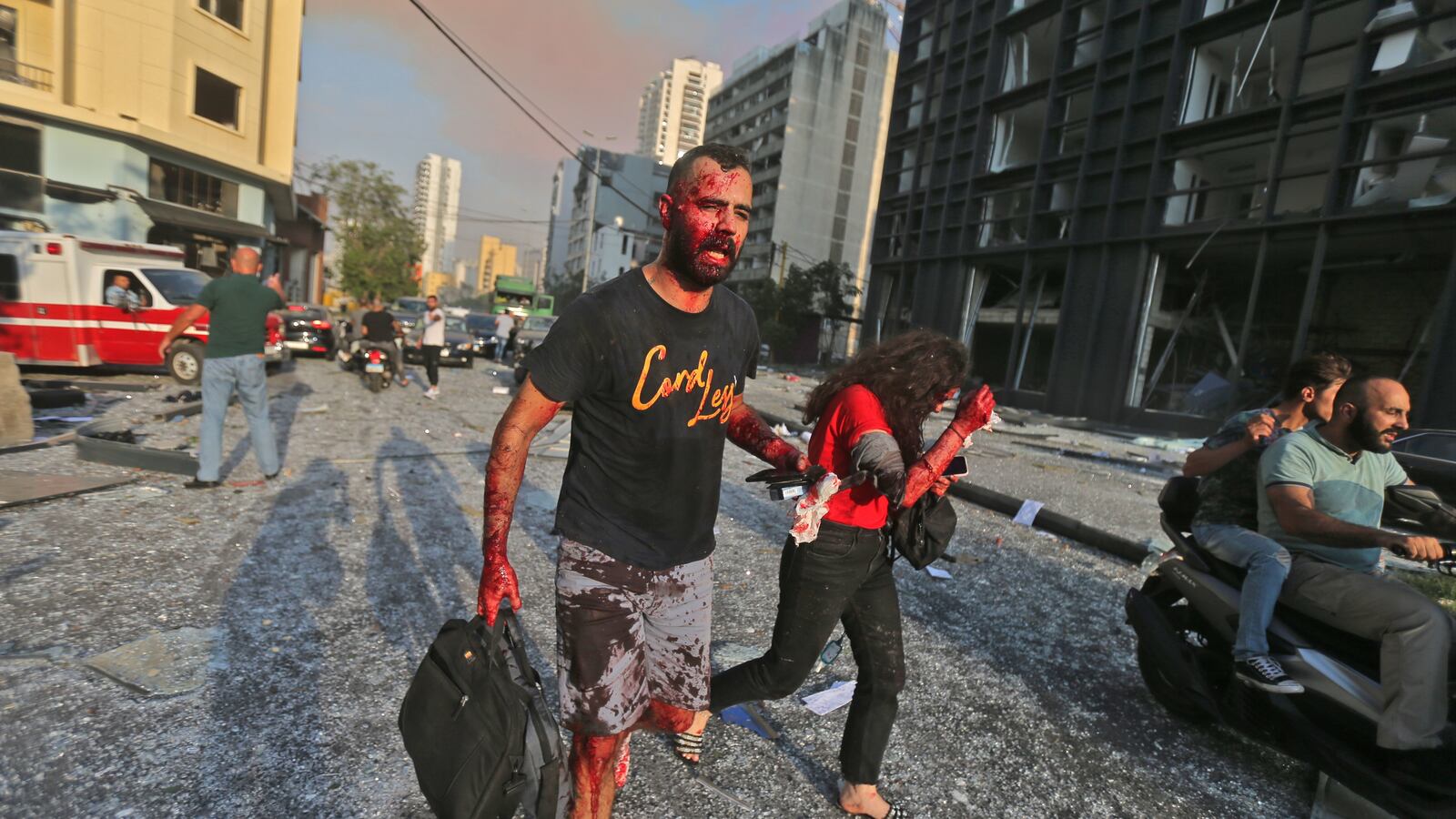A huge explosion rocked Beirut, Lebanon, Tuesday destroying entire blocks of high-rise buildings and leaving at least 73 people confirmed dead, more than 3,700 wounded, and scores more feared buried under rubble and ash. The country’s interior minister said early indications were that highly explosive materials, seized and stored at Beirut’s port, had detonated.
Footage of the blast showed a large plume of dark red flames and smoke before a massive explosion threw up a mushroom cloud. Powerful shock waves shattered glass, collapsed ceilings and pulled down balconies—even residents on the island nation of Cyprus, 110 miles away, heard the blast.
A witness on the ground who works for the United Nations, but does not speak on their behalf, was near the port when the explosion happened. She told The Daily Beast that bodies were scattered from the blast. “There was dark smoke from a fire and then a massive blast and everyone fell to the ground,” she said. “A lot of people didn’t get up.”
Entire buildings collapsed, streets glistened under blankets of shattered glass, and injured residents wandered the city covered in blood. Lebanese media carried images of people trapped under rubble.
Residents rushed the injured to hospital any way they could, carrying them on their shoulders, on the trunks of cars and on ash-covered pieces of debris.

A man is evacuated at the site of an explosion.
Mohamed Azakir/Reuters“What we are witnessing is a huge catastrophe,” George Kettani, head of Lebanon’s Red Cross, told local TV network Mayadeen. “There are victims and casualties everywhere.”
Abbas Ibrahim, director of General Security, told Lebanese media at a press conference that Israel was not to blame for the explosion. He pointed the finger at a depot at the port where highly explosive materials were stored after being confiscated.
Local media reports also indicated that the blast may have ripped through a fireworks warehouse. It was not yet clear what ignited a fire that could be seen shortly before the main explosion.

Residents rushed injured people to hospital any way they could.
Marwan Tahtah/GettyCNN’s Ben Wedeman, who is based in Beirut, was in the bureau about a kilometer away before the blast. He reported on CNN that people were tweeting photos of a fire in the port about 15 minutes before a massive blast shook the building, destroying the bureau.
He described a large red cloud hanging low over the city. “The city is in a state of panic,” he said on CNN. “The city is in a state of shock.”
France 24 correspondent Leila Molana-Allen wrote on Twitter that her apartment was blown apart. “All the buildings in my block are destroyed. Huge explosion in #Beirut. Everyone covered in glass and blood,” she wrote.

A general view of destruction at the port of Beirut.
STR/GettyHours after the blast at 6 p.m. local time, fires were still burning in the port district. Hospitals, already buckling under the coronavirus pandemic, were overwhelmed with patients.
The blast came as the city braces for the verdict in a long-awaited trial over the assassination of former Sunni prime minister Rafik al-Hariri who was killed in a truck bomb 15 years ago. The defendants, from the Iran-backed group Hezbollah, are being tried in absentia. That verdict is expected Friday.
Beirut has been under siege by angry protesters demonstrating against economic strife and alleged corruption since the October Revolution kicked off in the fall of 2019. Daily demonstrations and widespread resignations have crippled the government.
Before that, the city buckled under the a civil war that lasted from 1975 to 1990.
Tuesday’s blast was by far the biggest explosion to hit the city since the 2006 war with Israel.






